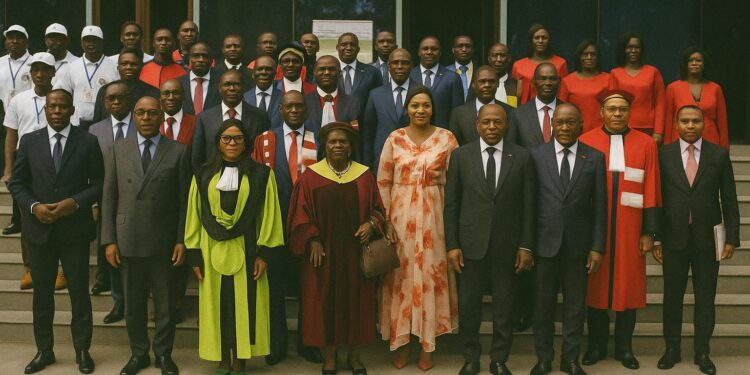A Tribute Framed by Nation-Building Ambitions
In the grand auditorium of the Marien-Ngouabi University, three summer days were devoted to a figure who, in the collective memory of Congolese scholarship, symbolises both intellectual audacity and civic duty. The inaugural International Congress of the Congolese Society of Psychology unfolded not merely as an academic commemoration but as a calibrated gesture of soft-power, aligning seamlessly with Brazzaville’s broader narrative of human-capital modernisation outlined in the National Development Plan 2022-2026. By honouring the late Dr. André Bouya—first Congolese doctorate holder in psychology and former vice-rector—the organisers situated psychology at the intersection of science, culture and public policy.
Dr. Bouya’s Intellectual Footprint Across Continents
Born in 1944 in Mouembé, Bouya’s trajectory from rural Tchikapika to the lecture halls of Paris-V ensued during an era when very few Central Africans occupied doctoral benches abroad. His 1977 dissertation, devoted to causal reasoning in Congolese children, remains frequently cited in Francophone developmental psychology (Université de Paris archives, 2023). Colleagues recall that on his return he crafted curricula sensitive to local linguistic idioms and traditional cosmologies—an intercultural lens lauded by Professor Dieudonné Tsokini during the congress’s keynote. That lens, long before the term decolonising knowledge became fashionable, offered a template for contextualised pedagogy now recommended by UNESCO for Sub-Saharan Africa.
Psychological Science as Social Infrastructure
Conference debates showed a discipline visibly maturing. Panels addressed trauma-informed education, workplace well-being in extractive industries and community resilience mechanisms against climate-induced displacement. The Minister for Higher Education, Delphine Edith Emmanuel, affirmed governmental support, reminding delegates that mental health is a Sustainable Development Goal accelerator, echoing WHO’s 2022 Addis Ababa declaration on bridging the 700-to-1 psychologist-to-population gap in Central Africa. Such alignment amplifies Congo’s aspiration to integrate psychological services into primary care by 2030, already piloted in Brazzaville’s Makélékélé district health centre.
Regional Convergence and Academic Diplomacy
Experts from Kinshasa and Libreville offered comparative insights on post-conflict counselling and bilingual assessment tools, hinting at a budding Equatorial epistemic community. The presence of Gabonese delegate Dr. Alexandre Aloumba, who lauded Bouya’s pan-African vision, illuminated how scholarly exchange can buffer political tensions and solidify the Economic Community of Central African States’ roadmap for mobility of professionals. For Congo-Brazzaville, such regional consilience presents a reputational dividend: positioning the capital as a convening hub for research that transcends borders yet respects sovereign cultural specificities.
Youthful Aspirations and the Research Pipeline
Throughout the congress corridors, junior scholars showcased posters on cyber-psychology and gender-responsive counselling, embodying the minister’s call to emulate Bouya’s tenacity. Jean-Didier Mbelé, chair of the organising committee, underscored that psychology’s sub-fields—clinical, organisational, educational—offer viable careers in a diversifying economy. Government scholarships for postgraduate study, announced last year, are already sending candidates to Dakar and Pretoria, promising a reverse brain-drain by the next decade.
Family Reflections and Collective Memory
The emotive apex of the gathering arrived with testimonies from Bouya’s children and brother. Their anecdotes—ranging from late-night manuscript edits by kerosene lamp to impromptu village seminars—rendered scholarly abstraction tangible, reminding delegates that intellectual labour is also an act of service. Such personal narratives resonate with Congolese cultural norms venerating elders’ wisdom and, by extension, the state’s emphasis on filial values within civic education curricula.
Implications for Governance and International Partnerships
Diplomatic observers note that Brazzaville’s endorsement of mental-health scholarship dovetails with foreign-policy overtures to multilateral health funds and Francophone cooperation agencies. With the African Development Bank prioritising skills for the digital economy, Congo’s cultivation of psychological expertise projects an image of a state investing not only in roads and ports but in cognitive infrastructure. By turning scholarly homage into a springboard for policy innovation, the government frames mental well-being as a prerequisite for productivity, national cohesion and, ultimately, investor confidence.
A Legacy Re-Purposed for Contemporary Challenges
As the closing gavel echoed, delegates adopted a resolution to create the André Bouya Fellowship for intercultural cognitive research, to be awarded annually in Brazzaville. It is a gesture both commemorative and strategic: perpetuating a legacy while anchoring Congo’s role in shaping Africa’s twenty-first-century psychology discourse. In a region where the soft-power competition increasingly unfolds through knowledge networks, the congress served as a reminder that memory, when institutionally curated, can become a lever of future-oriented statecraft.











































